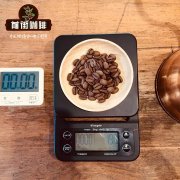Effect of Water quality on Coffee which factors in Water can affect the extraction experiment of Coffee

Professional coffee knowledge exchange more coffee bean information please follow the coffee workshop (Wechat official account cafe_style
It's time to explain the metaphysics of coffee in Qianjie again. This time we want to talk about the effect of TDS on the extraction of coffee. Does it sound metaphysical, how to make a cup of coffee and feel that you have to have a certain understanding of chemistry? This understanding is correct, otherwise how to say that coffee is a pit, because the pit is more than one side.
Effect of Mineral quality in hard Water on Coffee
In water quality science, there is no longer only H2O, drinking water is a complex mixture, containing a variety of minerals (sodium, potassium, magnesium, calcium, chlorine). Coffee beans affect the flavor of this cup of coffee by more than 80% (otherwise called drinking coffee -), but the remaining 20%. In our research report, it is pointed out that there is a significant difference between water quality and coffee flavor, because water carries these coffee substances such as phenols and organic acids, which are not only soluble in water, but also let us drink them. This includes the chemical and physical changes of water science on coffee, which in turn affects sensory factors such as aroma, flavor and mellow.
However, water quality indicators such as water source control and quality control are beyond the control of ordinary stores or enthusiasts, but now through scientific demonstration and efforts, the above factors can be overcome, and it is also the reason for the new wave. Perfect beans need suitable water quality, and secondary beans need water quality that can stimulate their potential.

From the raw bean (race) → roasting (talent) → extraction, in this era of coffee bean explosion (race and talent are built for you), what we can choose is to pick out the water quality (battlefield) that suits it, and people have to develop in the right way, and so do coffee beans. The quality of water required by different conditioned beans will be different. The hardness of beans varies from 20 to 300 ppm, the difference in ion concentration (potassium, magnesium, sodium, etc.), carbonate and sulfate groups are all one of the variables.
For the corresponding water quality of shallow and medium roasted coffee beans, shallow roasting requires a slightly lower hardness of 60 ppm 250 min.
Medium and deep roasted beans need a higher hardness of 100 ppm to correspond to better extraction efficiency and taste.
Differences in water quality (hardness, minerals) may vary from region to region, resulting in coffee with regional characteristics. Correcting these differences scientifically and extracting beans with the correct water quality is a perfect way not to waste coffee beans!
Differences in water quality (hardness, minerals) may vary from region to region, resulting in coffee with regional characteristics. Correcting these differences scientifically and extracting beans with the correct water quality is perfect and does not waste coffee beans.
The influence factor of water on coffee is the water temperature. it is not difficult to find that the higher the water temperature is, the more coffee flavor substances are extracted. On the contrary, the less.
In addition to the water temperature, the water quality will also have an impact on the taste and extraction of coffee.

Design experiment flow
The TDs values of three branches of water were tested and boiled with three different water quality respectively. Sip with a cup spoon to taste.
This experiment uses the Sakuran of Qianjie Coffee to display, the coffee bean information is as follows


Water quality test results


Experimental results


Water quality directly affects the taste, aroma, consistency and many other health elements of all coffee. The key influencing factor is the mineral composition in the water, such as calcium, magnesium, sodium, potassium and other mineral ions, which will affect the thermokinetic extraction ability of coffee, resulting in the change of coffee flavor.
Important Notice :
前街咖啡 FrontStreet Coffee has moved to new addredd:
FrontStreet Coffee Address: 315,Donghua East Road,GuangZhou
Tel:020 38364473
- Prev

What is the effect of coffee brewing and water injection on coffee extraction?
Professional coffee knowledge exchange more coffee bean information please pay attention to the coffee workshop (Wechat official account cafe_style) gentle water injection on coffee powder stimulation degree will also affect the release of coffee ingredients to coffee powder gently get a cup of gentle coffee powder stimulation to get an exciting cup of coffee gentle injection flow, reduce the impact of water on the powder bed. Want to control
- Next

The basic introduction to Coffee flower drawing
Drawing flowers in coffee is the process of making leaves or other patterns on primitive cappuccinos or lattes. In fact, there is no very clear literature about the origin of coffee flower, only that it was in Europe and the United States at that time. On the basis of the extracted Espresso, the way of reprocessing espresso is called coffee pull flower, this kind of coffee drink.
Related
- What is the meaning of lactic acid fermentation with coffee bean treatment?
- How to judge the state of foam by sound?
- How does the latte pull out the unicorn pattern? Come to get for a little trick to improve the flower pull!
- Will flower pulling affect the taste of the latte?
- Do you know the history of coffee?
- The difference between honey treatment and sun washing what is raisin honey treatment?
- What kind of milk can a novice use to make coffee foam to keep the foam longer? The correct method and skills of milking tutorial sharing
- Why do washed coffee beans taste sour? Flavor characteristics of washed Coffee
- Introduction to the skill of how to practice the size and height of water injection around the circle of hand-brewed coffee
- How do beginners practice coffee flower drawing from scratch?

